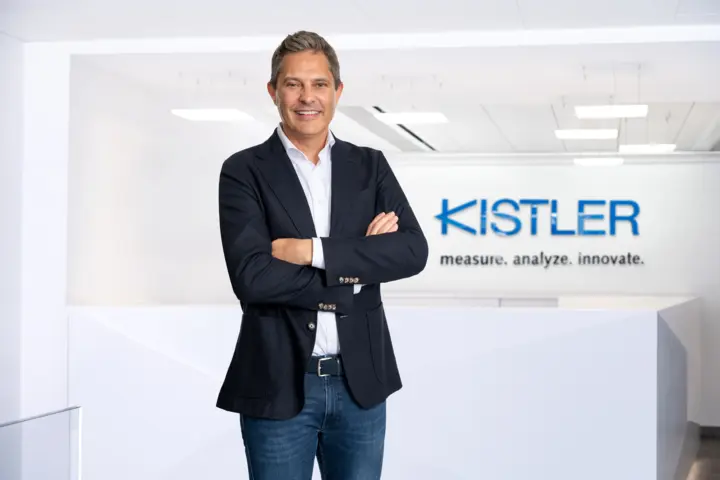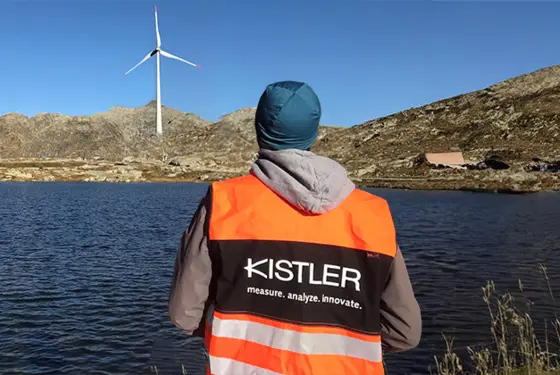At the heart of every Kistler product lies a small crystal – most of them cultivated entirely in-house. This crystal has become both a symbol of the company’s commitment to precision and quality and the physical core of its high-performance sensors. The sensors harness the piezoelectric effect: the crystal responds to mechanical load like vibrations or pressure by generating electrical charges – a phenomenon already discovered by Pierre and Jacques Curie in the 19th century. It was not until late 1950s, however, that Kistler developed the charge amplifier technology required to measure this effect reliably, laying the foundation for the widespread use of crystal sensors in industrial measurement.
Swiss sensor technology thriving in China
Measurement technology plays a key role in driving innovation and reducing emissions. In recent years, the Swiss-based company Kistler has been expanding its presence in China, where it supports China’s ambitions in green transformation and e-mobility.

Today, Kistler is one of the global market leaders in dynamic pressure, force, torque, and acceleration measurement with more than 60 locations and around 2,000 employees worldwide. Its sensors are applied in a broad range of fields, enhancing efficiency, safety, and sustainability in industries such as automotive, manufacturing, life sciences, aerospace and medicine.
The measurement data generated with Kistler technology enable companies to test and refine their products, thereby driving progress and new innovative solutions. This makes the sensors highly relevant to China’s ambitions in the e-mobility sector and its broader goals for green growth. The country wants to achieve carbon neutrality by 2060 and become the leading market and manufacturer of e-mobility products. It is therefore no surprise that China has become one of Kistler’s most important markets: the company’s sensors play a vital role in the technical innovation and green transformation for China’s industrial upgrading, especially in the automotive industry.
Strong commitment to China
Alban Brisset, general manager China of the Kistler Group, is one of the company’s key leaders on the ground. With strong engineering background, he has worked in China since the mid-2000s and speaks fluent Chinese which helps him gain the deep understanding of the country and the local market. As an automotive expert, he values the pace of the market and its trajectory in China. “I appreciate the dynamism here and see huge potential for sustainable development,” he says. “Kistler combines Swiss engineering excellence with a global footprint – it’s our strength helping Chinese customers achieving sustainable growth.”
In total, around 150 Kistler employees work in China since 1996. About 100 of them are based in the company’s seven-story office building in the Shanghai-Hongqiao Business Park. The building houses Kistler’s gleaming precision measurement systems and equipment in the laboratories – a showcase of the company’s technological excellence and innovation capabilities. More recently, Kistler launched a new production line for joining systems in China. And with its China Rising initiative, the company is further strengthening its local footprint by placing an even greater focus on localization.
For Alban Brisset the investments underscore the company’s long-term commitment: “Our presence on-site strengthens customer communication and puts us in a much stronger position to deliver comprehensive service, sales, and technical support.” Being present in China also means planning security. “Geopolitical changes can quickly disrupt global supply chains. Our local presence helps to mitigate those risks.”
Making electronic vehicles safer and more comfortable
Kistler’s technology, long trusted by automotive developers worldwide, is playing a key role in China’s automotive industry today – helping to analyze processes, improve ride comfort, and accelerate the shift to electric mobility. Achieving comfort in vehicles – whether powered by combustion or batteries – requires careful balancing of noise and vibration. While electronic vehicles are generally quiet, the lack of any motor noise makes any whistling sound or vibration even more noticeable. “Sounds or vibrations can really be unpleasant and distracting for passengers,” says Brisset. “Our sensors help to detect such unwanted product characteristics before a vehicle is brought to market.”
Kistler’s sensors also boost safety. In 2023, the company opened a Crash Dummy Laboratory in Shanghai, providing calibration and safety services across Asia helping to protect both pedestrians and occupants.
To further advance e-mobility, the company works closely with Original Equipment Manufacturers (OEMs), TIER 1 suppliers and engineering firms. Current projects include the development of a system to analyze the complete electrical drivetrain and a battery temperature measurement solution designed to ensure durability and safety. “Our ultimate goal is to provide solutions that support the entire development process of electric vehicles,” Brisset explains.
Free Trade Agreement for sustainable development
The success of Kistler in China also builds on the close economic and political ties between Switzerland and China. Since the establishment of diplomatic relations in 1950, the two countries have developed a strong and multifaceted partnership – despite significant differences in market size and economic structure.
The Free Trade Agreement in place since 2013 not only facilitates trade in goods and services but also promotes sustainable development and innovation – priorities that closely align with Kistler’s own sustainability strategy, which extends far beyond the automotive sector.
One example is the industrial use of Kistler’s joining systems. These solutions monitor, control, and optimize press-fit and joining operations not only in the automotive and supplier industries but also in fields such as medical technology and household appliances. A new electromechanical joining system developed by Kister is far more energy-efficient than conventional pneumatic or hydraulic alternatives: a German study found potential energy savings of up to 93 percent.
“We are eager to develop new solutions in, with, and for China,” says Marc Schaad, CEO of the Kistler Group. “Sustainability is central to Kistler’s strategy – and includes investing in people.”
Continuous investment with social responsibilities
Promoting healthy and stable working conditions is a priority for the company. Kistler has received multiple Best Employer awards in China – including recognition for its commitment to workplace health and well-being. On the other hand, Kistler’s scholarship programs with Chinese universities help to secure the next generation of talent for the industry while strengthening international collaboration.
“China harbors significant untapped potential and has become an integral part of the Kistler Group,” says Schaad. Further investments are already planned and Kistler remains confident that its business in and with China will continue to consolidate and grow in the years ahead.





![Swiss sensor technology thriving in China [object Object]](https://kistler.cdn.celum.cloud/SAPCommerce_Document_Preview/999-352e.webp)